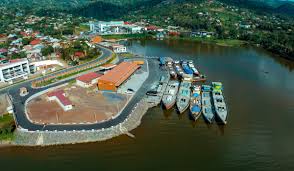Rwanda is moving to strengthen its position as a logistics hub in East Africa by investing heavily in transport projects along Lake Kivu. The projects, which include the construction of modern ports, are designed to unlock new trade routes, ease connectivity across the region, and prepare the country for growing opportunities under the African Continental Free Trade Area (AfCFTA).
According to Invest Rwanda, the state agency championing investment opportunities, the Lake Kivu projects are part of a broader strategy to transform Rwanda into a competitive gateway for goods and services in the Great Lakes region. Officials say improved water transport will not only connect Rwandan businesses to regional markets but also reduce the cost of moving goods for local traders, farmers, and industries.
Lake Kivu, which stretches across the border between Rwanda and the Democratic Republic of Congo (DRC), has long been seen as a potential trade corridor. The government is now turning that vision into reality with the development of new ports at Rusizi, Karongi, and Rubavu. Each port is being designed with modern facilities to handle both passengers and cargo, making the lake a viable alternative to road transport.
The projects are expected to benefit thousands of small businesses that rely on trade between Rwanda and DRC, especially in border towns where agriculture and informal commerce dominate daily life. Rwanda Development Board (RDB) officials noted that better transport will reduce turnaround time for goods, cut logistics costs, and open new markets for Rwandan exports ranging from tea and coffee to manufactured products.
Experts also believe the ports will play a critical role in positioning Rwanda as a player in the AfCFTA, the continental trade pact that seeks to create a single market for goods and services across Africa. By improving access to neighboring DRC—a country of over 100 million people—Rwanda can expand its market reach and integrate more deeply into regional supply chains.
In addition, the water transport system is expected to relieve pressure on Rwanda’s road network, which carries the bulk of goods traffic today. Transporters have long complained about high fuel costs, traffic congestion, and delays at border crossings. With Lake Kivu ports offering an alternative, Rwanda hopes to create a more balanced and efficient logistics system.
Local communities around the lake are also set to benefit. Authorities say the port projects will generate employment during construction and create long-term opportunities in logistics, trade, tourism, and services. The government is encouraging private investors to take advantage of the new infrastructure by setting up businesses such as cargo handling firms, hospitality ventures, and transport services.
Rwanda’s efforts are part of a larger vision to transform the country into a service-led economy with strong regional linkages. In recent years, Kigali has invested in aviation, digital infrastructure, and industrial parks. The Lake Kivu transport projects now add a water-based component to this push, reinforcing Rwanda’s reputation as one of Africa’s most ambitious reformers.
Regional analysts say the timing of the investment is critical. With the AfCFTA gradually taking shape, countries that improve their transport and logistics systems early are more likely to benefit from increased trade flows. Rwanda’s location, bordered by landlocked economies such as Uganda and Burundi, could allow it to serve as a vital link between East and Central Africa.
The government has also tied the projects to its environmental agenda, with plans to encourage fuel-efficient vessels and reduce carbon emissions compared to road transport. This aligns with Rwanda’s broader commitment to green growth and sustainable development.
Challenges remain, however. Financing the construction and maintenance of the ports will require strong partnerships with development banks, private investors, and regional institutions. There are also security and regulatory issues around cross-border trade that need to be addressed to maximize the benefits of the new infrastructure.
Still, for policymakers in Kigali, the Lake Kivu transport projects are more than just infrastructure—they are a signal of Rwanda’s determination to turn geography into opportunity. With trade flows in Africa shifting under AfCFTA and regional economies seeking new ways to industrialize, Rwanda is betting that its investment in connectivity today will pay off in growth, jobs, and competitiveness tomorrow.
